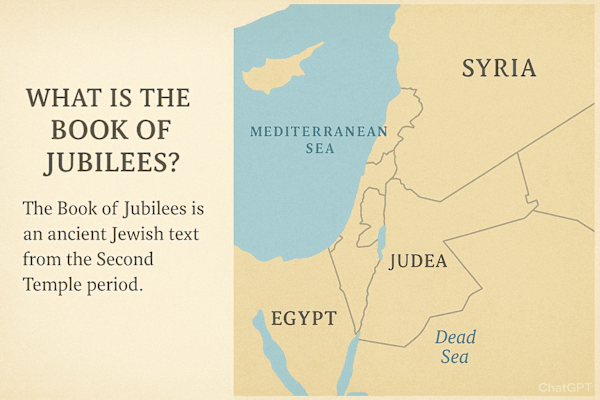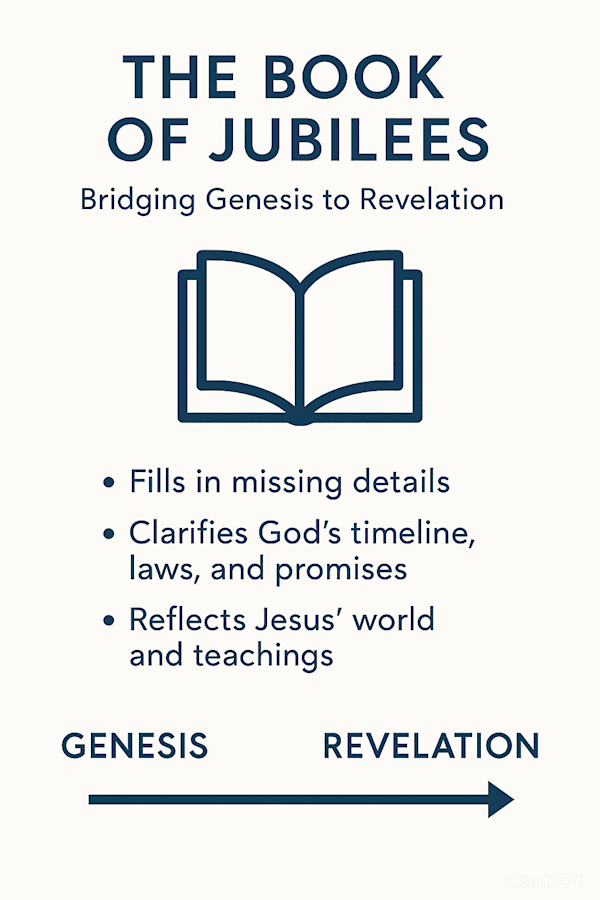The Book of Jubilees – The Ancient Key to Understanding Genesis Through Revelation
An Overlooked Treasure!
Most Christians have never even heard of the Book of Jubilees.
Yet in the days of Jesus and the apostles, it was part of the spiritual and cultural air they breathed.
Jubilees bridges the gap between Genesis and Revelation, revealing the connections, timelines, and spiritual realities that shaped the way New Testament writers understood God’s plan for the world.
If 1 Enoch helps us understand the gaps in Genesis, then Jubilees helps us understand the flow of God’s story from the very beginning to the end of the age.
What is the Book of Jubilees?
Written around the middle of the 2nd century BC, probably in Palestine.
Discovered among the Dead Sea Scrolls, the third most common text at Qumran, after Genesis and 1 Enoch.
Preserved in full in the Ethiopian Jewish and Christian tradition, where it’s known as the Book of Divisions.
Retells Genesis and Exodus with expanded details, ancient traditions, and stories known to Jews in the Second Temple period.
Structured around a “calendar of creation”, dividing history into sabbaths, feast cycles, sabbath years, and jubilee years.
Why Does Jubilees Matter Today?
1. It shows us Jesus’ world.
Jubilees was widely known in the first century. Many sayings of Jesus and the apostles make more sense once you see the traditions they were drawing from.
2. It connects Genesis to Revelation.
The book reveals the spiritual patterns woven through Scripture, angels, demons, the heavenly temple, and the union of worship in heaven and on earth.
3. It fills historical and theological gaps.
Jubilees explains puzzling details in the Bible, from strange timelines to the origins of evil spirits.
4. It reveals the “calendar of creation.”
For the author of Jubilees, God’s structure for time wasn’t invented at Sinai, it was embedded into creation itself.
The Influence of Jubilees on the New Testament
You don’t have to take my word for it, here are clear examples:
Stephen’s speech (Acts 7)
Includes traditions from Jubilees, not found in Genesis/Exodus, such as Jacob and all the patriarchs being buried at Shechem (Jub 46:9).
Jesus in Luke 11:49
Quotes the “Wisdom of God” — a line found in Jubilees 1:12 about God sending prophets who would be killed.
Peter in 2 Peter 2:5
Calls Noah a “preacher of righteousness” — exactly as described in Jubilees 7:20-39.
Paul in Galatians 3:17
Says the Law came 430 years after the covenant with Abraham — a timeline that matches Jubilees 15:4 perfectly.
Revelation 1:6; 5:10
Describes God’s people as “a kingdom and priests” — a phrase found word-for-word in Jubilees 16:18.
Why Bring Jubilees Back Into the Light?
The Book of Jubilees is not part of most Christian Bibles today. But in Jesus’ time, it shaped the worldview of His people and His disciples.
If we ignore it, we miss part of the divinely chosen context in which God gave His Word.
By understanding it, we can:
Read the Bible the way the first Christians did.
See the connections God wove into His story from creation to new creation.
Grow closer to Christ by understanding the Scriptures that shaped His ministry and teaching.
Over the coming weeks, I will share blogs, sermons, and simple teaching notes exploring the Book of Jubilees in plain language.
If you’ve ever wanted the Bible to “click” in a new way, this is your invitation to start the journey.

